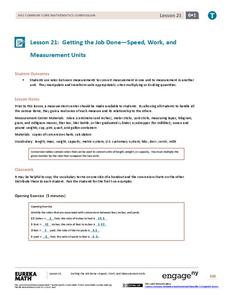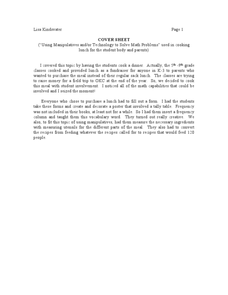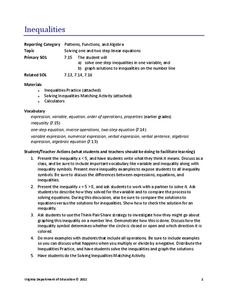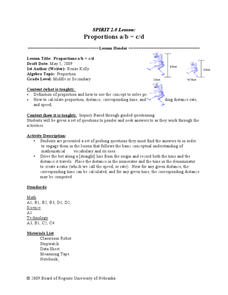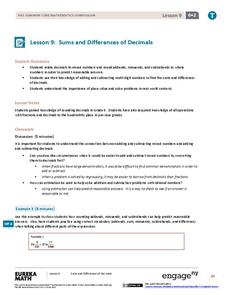Curated OER
Variables on Both Sides
Learners solve equations containing variables on both side of the equal sign. In this algebra activity, students combine like terms using opposite signs to get them on one side of the equal sign. They model the equations using bar models...
Curated OER
3-D Attributes
Students explore geometric solids. In this geometry lesson, students listen to the book The Greedy Triangle by Marilyn Burns, then work in groups to sort geometric solids into various categories. Students define geometric solids...
Curated OER
Mathematics Lesson for Grade 12
Twelfth graders examine multiple aspects of statistics. In this mathematical reasoning lesson, 12th graders solve problems on probability, logarithms, exponential relationships and transforming rectilinear shapes. This resource contains...
Curated OER
Is the Hudson River Too Salty to Drink?
Students explore reasons for varied salinity in bodies of water. In this geographical inquiry lesson plan, students use a variety of visual and written information including maps, data tables, and graphs, to form a hypothesis as to why...
Curated OER
Telling Time: Two Ways to Read the Time
Second graders discuss the two different ways of reading time. They study the vocabulary "minutes to" and tell time in five minute intervals. They discuss why it is important to have schedules and students list some schedules that they...
Curated OER
Computer Tracks Lunch Choices
Students read a story called Computer Program Tracks Lunch Choices and answer vocabulary and comprehension questions about it. In this current events literacy lesson plan, students respond to literature by answering questions, recalling...
EngageNY
Read Expressions in Which Letters Stand for Numbers
Pencil in the resource on writing verbal phrases into your lesson plans. The 15th installment of a 36-part module has scholars write verbal phases for algebraic expressions. They complete a set of problems to solidify this skill.
EngageNY
Getting the Job Done—Speed, Work, and Measurement Units
How do you convert from one measurement to another? Pupils use unit rates to convert measurements from one unit to another in the 21st segment in a 29-part series. They convert within the same system to solve length, capacity,...
Curated OER
Primary Counting Skills
Class members drill and practice counting skills from 1 to 20. They count along with a puppet and when the puppet makes a mistake, they correct it. In pairs, they connect cubes to make a train and count the number used. On the last of...
Curated OER
Stem-and-Leaf Plots
Seventh graders study steam-and-leaf plots. Given specific data, they create a stem-and-leaf plot . Students identify the mean, mode, range and median. Afterward, they review vocabulary words.
Curated OER
Linear Inequalities
Ninth graders explore solving linear inequalities. They discuss vocabulary words and symbols associated with linear inequalities. After a demonstration by the teacher, 9th graders solve and graph inequalities. Students complete a...
Curated OER
The Meaning of Algebraic Expressions
Students define equations and expressions. In this algebra lesson, students review important vocabulary words to do with equations and solving problems. They simplify equations and expressions using addition, subtraction, multiplication...
Curated OER
Angles
Fifth graders identify different angles according to its type that is determined according to taking a measurement of the degree. They also explore the vocabulary related to the concept.
Curated OER
"Using Manipulatives and/or Technology to Solve Math Problems" by Cooking Dinner
Students explore math functions by preparing a meal. In this food measurement lesson, students examine a recipe for a meal and alter the size of the recipe based upon the amount of servings needed. Students utilize manipulatives to...
Virginia Department of Education
Inductive and Deductive Reasoning
Introduce pupils to the two types of reasoning, inductive and deductive. Classmates work in pairs or small groups to learn the difference between the two and apply these reasonings to develop valid conclusions.
Virginia Department of Education
Translate and Evaluate
Translate, evaluate, educate. Discover how to translate and evaluate expressions. Young mathematicians first review words and phrases that indicate operations and learn to write algebraic expressions from verbal descriptions....
Virginia Department of Education
Lines and Angles
Explore angle relationships associated with transversals. Pupils construct parallel lines with a transversal and find the measures of the angles formed. They figure out how the different angles are related before constructing...
Virginia Department of Education
Inequalities
Not all resources are created equal — and your class benefits! Scholars learn how to solve one-step inequalities using inverse operations. They complete an activity matching inequalities to their solutions.
Curated OER
Proportions a/b=c/d
Students calculate distance and proportion of objects. In this algebra lesson, students define proportion and how it is used in math. They solve the problem through guided instruction.
EngageNY
Real-World Positive and Negative Numbers and Zero II
Continuing from the previous lesson in the series, scholars learn to use positive and negative integers to describe real-world situations. In groups, they come up with their own situations for given positive and negative integers.
Curated OER
Representing the Unknown
Student use mental math to solve linear equations. In this algebra lesson, students solve one and two steps equations. They write expressions using variables to identify the unknown.
EngageNY
Estimating Probabilities by Collecting Data
Take a spin to determine experimental probability. Small groups spin a spinner and keep track of the sums of the spins and calculate the resulting probabilities. Pupils use simulated frequencies to practice finding other probabilities to...
EngageNY
Sums and Differences of Decimals
Sometimes dealing with decimals is so much easier than dealing with fractions. The ninth lesson in a 21-part module has the class consider situations when it might be easier to add or subtract fractions by first converting to...
EngageNY
From Ratio Tables, Equations and Double Number Line Diagrams to Plots on the Coordinate Plane
Represent ratios using a variety of methods. Classmates combine the representations of ratios previously learned with the coordinate plane. Using ratio tables, equations, double number lines, and ordered pairs to represent...
Other popular searches
- Math Vocabulary Activities
- Esl Math Vocabulary
- Math Vocabulary Games
- Math Vocabulary Games Ell
- Math Vocabulary Cards
- Division Math Vocabulary
- Math Vocabulary Drawings
- Grade 4 Math Vocabulary
- Math Vocabulary Affixes
- Vocabulary Development Math
- Math Vocabulary Lesson
- Math Vocabulary Introduction







